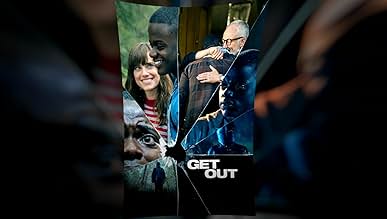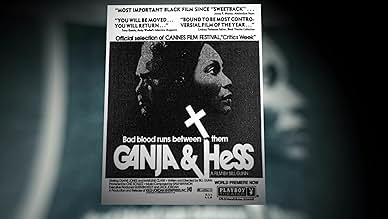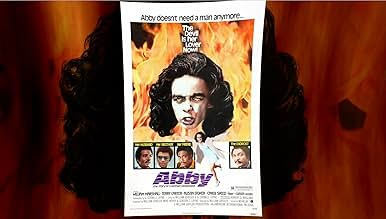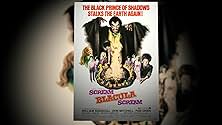NOTE IMDb
7,5/10
2,2 k
MA NOTE
Ajouter une intrigue dans votre langueA look at the history of black horror films and the role of African Americans in the film genre from the very beginning.A look at the history of black horror films and the role of African Americans in the film genre from the very beginning.A look at the history of black horror films and the role of African Americans in the film genre from the very beginning.
- Réalisation
- Scénario
- Casting principal
- Récompenses
- 2 victoires et 1 nomination au total
Robin R. Means Coleman
- Self - Author
- (as Robin R. Means Coleman PhD)
- …
Monica Moore Suriyage
- Self - Filmmaker
- (as Monica Suriyage)
Avis à la une
Playing YouTube channel Double Toasted review of Soul Plane in background, they mentioned about the video being sponsored by Shudder,and gave a free 30 day code. Being in lockdown and having wanted to sign up to the service for ages, this looked like the perfect time to sign up. Being a title I saw get praised by RedLetterMedia, I decided my first Shudder viewing would go back to the history of Horror.
View on the film:
Going right back to the horrors of The Birth of a Nation (1915) in his feature film debut, director Xavier Burgin lays out a fascinating canvas on the progression of black Horror cinema history, from Spencer Williams kicking against the system to get the first "Black Horror" made in Son of Ingagi (1940) and the ground breaking work of George Romero, to the wave of Blaxploitation and black Horror cinema of the 2012.
Criss-crossing the clips with interviews of the cast/crew from some of the films and academics, Burgin combines production tales with fascinating academic interpretations of highlighted films. From the Tuskegee syphilis experiment being referenced in Blxploitation films and Bill Gunn using the Horror genre for the deeply personal Ganja & Hess (1973), to Candyman (1992) and the magnificent The Girl with All the Gifts (2016-also reviewed), in bringing to light the history of black Horror.
View on the film:
Going right back to the horrors of The Birth of a Nation (1915) in his feature film debut, director Xavier Burgin lays out a fascinating canvas on the progression of black Horror cinema history, from Spencer Williams kicking against the system to get the first "Black Horror" made in Son of Ingagi (1940) and the ground breaking work of George Romero, to the wave of Blaxploitation and black Horror cinema of the 2012.
Criss-crossing the clips with interviews of the cast/crew from some of the films and academics, Burgin combines production tales with fascinating academic interpretations of highlighted films. From the Tuskegee syphilis experiment being referenced in Blxploitation films and Bill Gunn using the Horror genre for the deeply personal Ganja & Hess (1973), to Candyman (1992) and the magnificent The Girl with All the Gifts (2016-also reviewed), in bringing to light the history of black Horror.
I enjoyed the overview of black people in horror films, and being introduced to a couple of films that I missed when they were released. From scary black voodoo practitioners through "black guy who dies first" to (of course) Night of the Living Dead and on up to Get Out, a group of academics, directors, and actors talk about what the changes meant and how they reacted to it.
Why I don't rate it higher is that while the academics and screenwriters and directors had interesting things to say, the actors did not and said basically, only "man, I loved this." Not insightful. I suppose being able to have name actors in the cast means more people might watch the film, but if we're watching a film analysis documentary, maybe we care less about actors and more about the people who have insights they can better articulate.
Good info, half-wrong cast.
Why I don't rate it higher is that while the academics and screenwriters and directors had interesting things to say, the actors did not and said basically, only "man, I loved this." Not insightful. I suppose being able to have name actors in the cast means more people might watch the film, but if we're watching a film analysis documentary, maybe we care less about actors and more about the people who have insights they can better articulate.
Good info, half-wrong cast.
Great commentary and interviews by respected actors, filmmakers, writers and intellectuals on the history of Blacks in cinema and the horror genre. Fun to watch too.
They say any good book, movie, play, TV show, etc. should leave you wanting more, but Horror Noire left me wanting so much more that I wish it was twice as long as it was. It does a great job of showcasing the seldom appreciated black horror films and performances, but at less than 90 minutes, it could have used an extra half hour at least.
This is all due to the care that was obviously put into this documentary. The reason I wanted more is because it's so good and so informative and well put together. I highly recommend horror historians and fans of black film check this one out.
This is all due to the care that was obviously put into this documentary. The reason I wanted more is because it's so good and so informative and well put together. I highly recommend horror historians and fans of black film check this one out.
Look I'm a big fan of horror, especially when it has to do with the history for horror. And I also enjoy documentaries that dive into the behind of making such a film, and how it came to be whatnot. And "Horror Noire" does that properly, describing the history moments what the predominant black people went through. Although, there's few of these interviewees that sounded so sour, like a someone yapping, complaining. I mean I guess some film directors didn't want black people to come out in films or I guess these "monsters" were interpreted as blacks. Why not just think of those creatures, just creatures. All these subtext and metaphors that they're trying to dive in too deeply. How come when it comes to black movies, why's it all the time it revolves around racism, slavery, gang, absent of parent?? Just like what Jordan Peele said about not being stuck in a bubble anymore, okay, then use that analogy of talking about something else besides slavery, racism. There's other things that are as important to dive in like sexual abuse, child trafficking, sicknesses etc.
Le saviez-vous
- ConnexionsFeatures Naissance d'une nation (1915)
Meilleurs choix
Connectez-vous pour évaluer et suivre la liste de favoris afin de recevoir des recommandations personnalisées
- How long is Horror Noire: A History of Black Horror?Alimenté par Alexa
Détails
- Date de sortie
- Pays d’origine
- Langue
- Aussi connu sous le nom de
- Хоррор-нуар: История чёрного хоррора
- Société de production
- Voir plus de crédits d'entreprise sur IMDbPro
- Durée
- 1h 23min(83 min)
- Couleur
- Rapport de forme
- 1.78 : 1
Contribuer à cette page
Suggérer une modification ou ajouter du contenu manquant





































